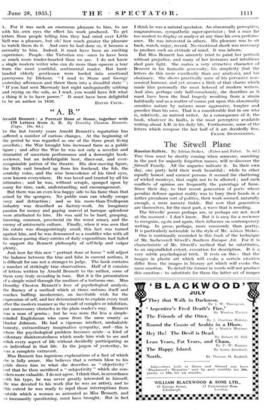" A B
Arnold Bennett : a Portrait Done at Home, together with 170 Letters from A. B. By Dorothy Cheston Bennett. (Cape. 10s. 6d.) IN the last twenty years Arnold Bennett's reputation has suffered a number of curious changes. At the beginning of the period he was regarded as one of the three great living novelists ; the War brought him increased fame as a public figure ; and after the War he was not only a novelist and dramatist of uncertain performance and a downright book- reviewer, but an indefatigable host, diner-out, and ever- recognizable patron of the theatre. His slow-moving figure, the little curl brushed up from his forehead, the fob, the scratchy voice, and the wise benevolence of his tired eyes, were known everywhere. He was loved and trusted by all his intimates ; and he was, without scruple, sponged upon by many for time, cash, understanding, and encouragement.
But there was an even less happy side to his fame than that seized by the spongers. No public man can wholly escape envy and detraction ; and so his more-than-Trollopean industry was described as factory-work. An imaginary passion for money and gaping marvel at baroque splendour were attributed to him. He was said to be hard, grasping, knowing, common, provincial (in the worst sense), and the enemy of aristocratic culture. Finally, when it was seen that his estate was disappointingly small, this fact was turned against him, and he was denounced as a muddler who with all his cheese-paring diary-entries of daily expenditure had failed to support the Bennett philosophy of self-help and vulgar plenty.
Just how far this new " portrait done at home " will adjust the balance between the true and false in current notions, it is difficult for one not a stranger to judge. The book contains a number of strikingly true observations. Half of it consists of letters written by Arnold Bennett to the author, some of them very truly revealing in tone. But it is the presentation of a simple mind through the medium of a tortuous one. Miss Dorothy Cheston Bennett's love of psychological analysis, the fluency of a method which at times outruns itself and reaches baffling incoherence, an inevitable wish for the expression of self, and her determination to explain every trait after the modern manner as the result of complex or inhibition, put unnecessary obstacles in the plain reader's way. Bennett was a man of genius ; but he was none the less a simple- minded Englishman who came from the same county as Doctor Johnson. He had a vigorous intellect, unshakable honesty, extraordinary imaginative sympathy, and—this is where the psychological problem becomes acute—a kind of sedentary disinterestedness which made him wish to see and relish every aspect of life without decidedly participating as an individual in that life. In the jargon of yesterday, he was a complete extravert.
Miss Bennett has ingenious explanations of a fact of which she is fully aware. She believes that a certain blow to his pride drove him to what she describes as " objectivity " and that he then sacrificed a " subjectivity " which she con- iders more valuable. I do not agree. I think that, in accordance with his type, he was never greatly interested in himself. He was devoted to his work (for he was an artist), and to this extent he was ready to repel those interruptions from aitside which a woman as animated as Miss Bennett, and as incessantly questioning, must have brought. But in fact
I think he was a natural spectator. An abnormally perceptive, magnanimous, sympathetic super-spectator ; but a man far too modest to display or analyse at any time his own perform- ance. He was interested in others. His pleasure was to sit back, watch, enjoy, record. No emotional shock was necessary to produce such an attitude of mind. It was inborn.
But Miss Bennett has sincerely tried to paint her portrait without prejudice, and many of her instances and intuitions shed pure light. She makes a very attractive character of Bennett in his fantastic genevosity, his simplicity (but the letters do this more excellently than any analysis), and his obstinacy. She shows practically none of his pervasive non- sensical humour, and yet secures a little of that charm which made him personally the most beloved of modern writers. And also, perhaps only half-consciously, she describes as it must have been the final tragedy resulting from a strain habitually and as a matter of course put upon this abnormally sensitive nature by natures more aggressive, tougher and greedier than his own. That is a considerable feat in one who is, relatively, an untried writer. As a consequence of it, the book, whatever its faults, is the most perceptive available writing about A.B. in his daily life. Furthermore, some of the letters which compose the last half of it are _decidedly fine.
FRANK SWINNERTON.






































 Previous page
Previous page